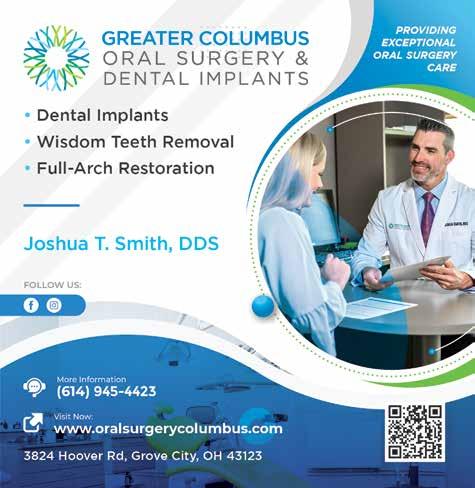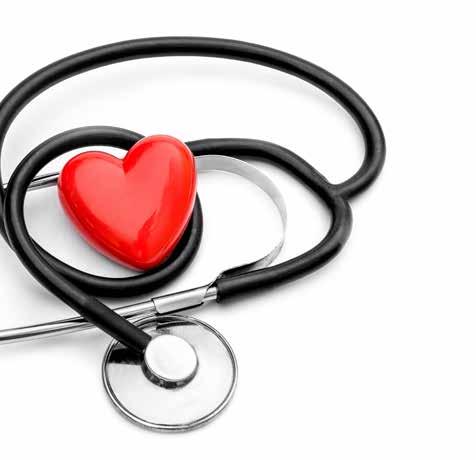
2 minute read
Top Tips Stay healthy with advice from local Docs
Oral Surgery Tips
Dr. Joshua T. Smith, DDS
Tip #1: Wisdom teeth, also known as third molars, are generally addressed between the ages of 17-25. Due to the risk of pain, adjacent teeth damage and infection, most people will need to have their wisdom teeth removed to prevent these problems. The extraction process in younger patients is significantly less traumatic and recovery is much quicker, which is why extraction is sometimes recommended even before symptoms arise.
Tip #2: Impacted teeth are defined as teeth that are prevented from erupting into the correct position due to lack of space or other impediments. These impacted teeth are frequently associated with cysts and tumors in the jaw bones, and can become a serious medical condition. It is therefore imperative that any impacted tooth be monitored for the development of any associated pathology and treated promptly.
Tip #3: There are several tooth replacement options, but a dental implant is considered to be the gold standard. The implant fixture is made of a titanium alloy, which integrates with the bone, making it a permanent part of the body. The success rate for dental implants is up to 98% when the procedure is performed by a well-trained surgeon. Any patient interested in missing tooth replacement should discuss their options with an oral surgeon to determine if they are a good candidate for this procedure.
Cancer Risk Reduction Tips
Kavya Krishna, M.D. Columbus Oncology & Hematology
Cancer is a tough disease, and interventions to reduce the risk of developing cancer are helpful. A healthy diet rich in vegetables, fruits, whole grains, legumes and nuts is beneficial. Limiting the amount of processed food and processed meat is recommended. Refraining from smoking – which increases the risk for various types of cancers, including lung, head and neck, pancreatic and bladder cancers – is advised, and your doctor can help with strategies to quit smoking.
Prevention and early detection of cancers, such as through regular mammograms in women and colon cancer screenings, increase chances of cure. Maintaining a healthy weight and active lifestyle lowers risk of breast, colon, prostate and other cancers. Any amount of physical activity is encouraged, but at least 30 minutes of exercise per day for five days a week, or weekly 150 minutes of moderate exercise with a doctor’s clearance, if you have any underlying health issues, is advised.
Skin cancer is a common and preventable cancer. Wearing appropriate sun protective gear, avoiding tanning beds, sunlamps, minimizing sun exposure between 10 a.m.-4 p.m. and getting any suspicious skin changes or new/changing moles checked by your doctor are encouraged.
Applying sunscreen with SPF of at least 30 to exposed areas, even when it is cloudy, with reapplication every two hours and more often if engaging in water activities or noticing increased sweating, is important.
Dental Health Tips
Dr. Missy Baker
The Gentle Dentist
Did you know that your dental health affects your overall health? Studies show that good oral hygiene not only decreases inflammation throughout the body, but it is also well documented that the bacteria in our mouths that cause gingivitis and periodontitis travel to blood vessels everywhere in the body, where they can cause damage. People with dental disease are more likely to have coronary artery disease and stroke, and are at a higher risk for pneumonia and pregnancy complications such as low birth weight.
Top Tooth Tips!
• Floss daily; if you do not floss, you miss 35% of your tooth's surface.
• In addition to brushing and flossing daily, using mouthwash every day should become part of your routine to ensure optimal oral health.
• Visiting your dentist two times a year for a thorough cleaning and exam, gum charting, cavity-detecting xrays and oral cancer screening can help ensure you are appropriately monitoring your oral health.

• Avoid a poor diet, especially one high in sugar; excessive alcohol use; tobacco use and chronic stress.
• Make sure you go to bed with a clean mouth. Do not go to bed without brushing and flossing your teeth. CS











